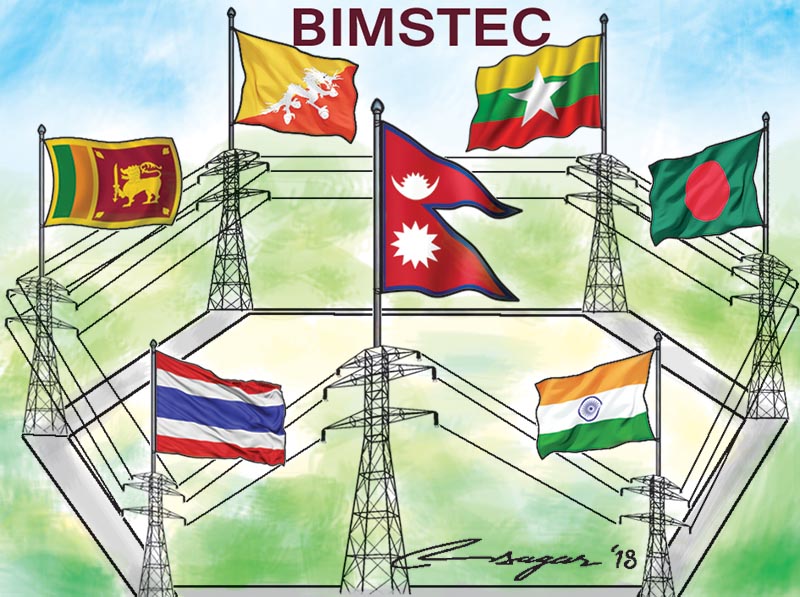BIMSTEC and Nepal: Working for shared benefits
Sharing ideas and cooperating with the succeeding Chair Sri Lanka would certainly guide the process of what all have been decided during Nepal’s chairmanship. There is a need of concerted efforts to feel and see the real outcomes
The fourth BIMSTEC Summit formally came to a successful conclusion on Friday with the issuance of the Kathmandu Declaration. As Chair, Nepal’s timely preparation and contributing participation in the summit has earned the country extensive experience. This is a highly valued national asset for regional cooperation.
Despite the visible success of the summit, experts now wonder how BIMSTEC will pay off—how we can materialise the adopted expression for the summit: “Towards a Peaceful, Prosperous and Sustainable Bay of Bengal Region”.
It has been two decades since the sub-regional bloc came into being, but the outcomes of this regional cooperation have hardly been felt by the people. Now is the time to take the process forward and achieve the objectives that were put forward during the Bangkok Declaration in 1997.
The just concluded summit has, however, presented hopes and optimism with tangible results for regional cooperation in the main areas of extensive networks for connectivity, trade, tourism, investment, cultural exchanges and people-to-people contacts. These are the cornerstone of lasting peace and prosperity of the region. Significantly, efforts to build up BIMSTEC’s legal and institutional organisation have also been visibly made for strengthening the regional integration.
Nepal on its part played a crucial role in coordinating and streamlining all agendas adopted by BIMSTEC so far to make them implementable and result-bearing. Noticeably, Nepal—with confidence, knowledge and working ability it gained in capacity of the reigning Chair—has taken initiatives to push forward the proposal to prepare a draft of a charter for the seven-member grouping. This important task is entrusted to the Secretariat of BIMSTEC. It now has to submit its preliminary draft with procedural, technical and administrative details to the newly formed BIMSTEC Permanent Working COMMITTEE (BPWC) for its consideration and to finally get it proposed during the fifth summit to be held in Sri Lanka, the newly chosen Chair. No specific timeframe has, however, been given for its proposal and approval.
It may be noted that drafting of a charter is not an easy job. It needs a long and pragmatic experience for a host of issues have to be taken into consideration, and most importantly where the national interests of member states subtly collide and contradict and where those interests converge. Meticulous study and research in minutia are of paramount importance.
Let us look back at the experiences of the other regional organisations. The European Union could prepare its charter Treaty of Lisbon in December 2009 after a long working experience gained over more than 52 years. Similarly, ASEAN did make its charter in December 2008, more than 41 years after its establishment. Nepal ventured with high spirit to move ahead in this respect. BIMSTEC now has to wait with patience until the fifth summit for the outcome.
The other initiative from Nepal came up in the form of a proposal of the Mountain Economy that calls for the balanced maintenance of the ecosystems and biodiversity to support sustainable development of the mountains and high hills. In fact, this proposal is needed to obliterate the clutches of the poverty in the mountain regions of Nepal and other member states. Nepal has indeed realised its duty as the lead country for poverty alleviation to bring forth programmes. The just concluded summit has endorsed the plan for the formation of the Inter-governmental Expert Panel to prepare the action plan for its approval.
Nepal succeeded in getting the Memorandum of Understanding on the BIMSTEC Grid Interconnection signed, the responsibility of which Nepal received after the conclusion of the ministerial meeting held in Kathmandu in August last year. Nepal’s continued efforts for endorsement of this understanding finally paid off.
Its implementation will broadly enlarge the grid interconnection among all member states for the sale and distribution of electricity. To date, Nepal has concluded such interconnection understandings with India and Bangladesh. The energy need is felt by each member state to meet their growing demands to drive their economy.
To remove the greatly felt lacunae of non-implementation of decisions and declarations, each member state needs to take ownership of all decisions and declarations with an avowed intent to make integrated parts of its domestic development plans and projects in close connection and consultation with BIMSTEC activities. That will indeed play a decisive and crucial role in ensuring the actual implementation of what has been decided and declared by BIMSTEC through its summits and meetings
Finally, to say something concrete, Nepal under a stable government has exhibited initiatives and drive to step up actions for the lead role on the important segments of the programmes for regional cooperation under BIMSTEC.
Sharing ideas and cooperating with the succeeding Chair Sri Lanka would certainly guide the process of what all have been decided during Nepal’s chairmanship.
There is a need of concerted efforts to feel and see the real outcomes.
Shrestha, an ex-foreign ministry official, is associated with Institute of Foreign Affairs






